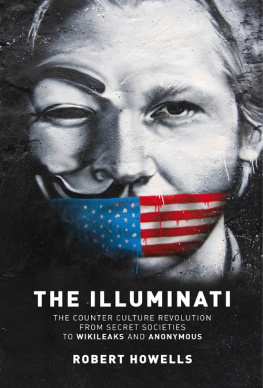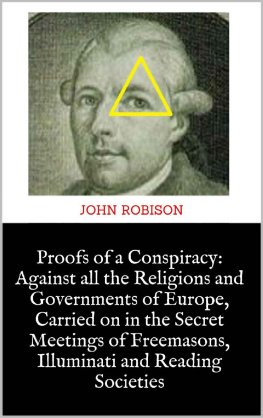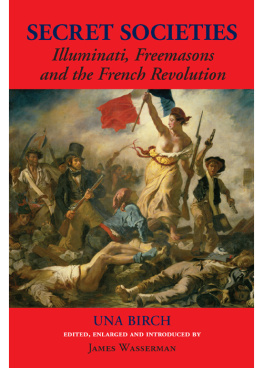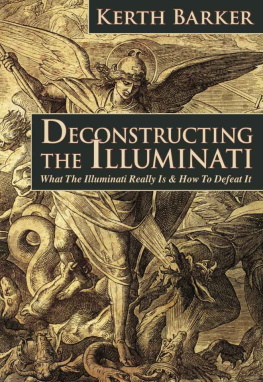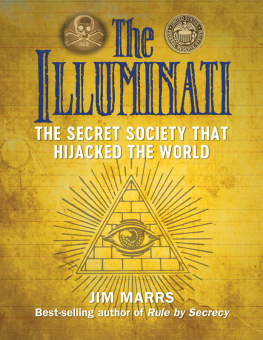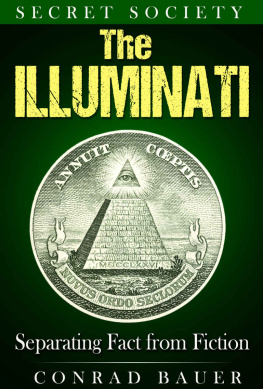ROBERT HOWELLS, born in London in 1968, has spent over 20 years investigating secret societies, counterculture and conspiracy theories. During this time he has built up an extensive knowledge and experience of secret societies, symbolism and esoteric thought.
As a manager for five years of Watkins Books in London, one of the oldest esoteric bookshops in Europe, he extended his research into comparative religion, transpersonal psychology, sacred geometry, Gnosticism and alchemy. He also came into contact with a number of secret societies during this time, including the Priory of Sion, the Freemasons, the Order of Lazarus and various neo-Templar orders, as well as Sufis and other religious groups.
His first book, Inside the Priory of Sion, was published in 2011 and his second book, The Last Pope, in June 2013.
Robert Howells is married with two children and lives in Kent, England.
Also by Robert Howells
Inside the Priory of Sion
The Last Pope
THE ILLUMINATI
THE COUNTERCULTURE REVOLUTION
FROM SECRET SOCIETIES
TO WIKILEAKS AND ANONYMOUS
ROBERT HOWELLS
This book is dedicated to:
Julian Assange, a refugee for truth,
Edward Snowden, a patriot in exile,
and my friend Paul John Denham, a prisoner without guilt.
ACKNOWLEDGEMENTS
The journey to bring this book into the world was long and arduous. I am indebted to the team at Watkins Media for their ongoing trust and support: to publisher Michael Mann for his patience and guidance; to Bob Saxton for his excellent editorial skills; to Vicky Hartley and the rest of the sales and marketing team for their unending efforts on my behalf; and to Etan Ifield, who sees the big picture.
Also, thanks to those who support my work from the outside, including Bruce Burgess and the many online community members both known and unknown.
And finally to my family and friends for taking a back seat as I headed for the far horizons of culture.
CONTENTS
Ask yourself What is the most important thing that I could be working on in the world right now? AARON SWARTZ (19862013)
The entire legal system is called into question when laws are used to persecute the innocent.
CHAPTER 1
THE COUNTERCULTURE IMPERATIVE
Socialization is a process by which we learn to fit into our surroundings.
This was the mantra of my social studies teacher which I learned to recite in secondary school at the tender age of 15. Even then I suspected it was the anathema of individuality and creativity, and on reflection I consider it an insidious piece of brainwashing to inflict upon young adults. Today, it is a lesson that I see taught everywhere, from the tide of mainstream media that vilifies and humiliates anyone who stands apart to religions that would imprison us with blatantly dishonest dogmas. Socialization is apparent in the words of our politicians that expect us to trust their disinformation and the actions of government agencies that imprison hackers for defacing the websites of morally corrupt corporations.
We should know better than to question the news channels that report wars as if they were the spectacle of a firework display while denying us the footage of bombed schools and hospitals filled with civilians. Nor should we call to account the economists who recommend deregulation that allows bankers to ravage the economy and walk away with huge bonuses. And there is absolutely no alternative to banks charging interest on the money they lend, which puts every country and individual in perpetual debt, making economic slaves of us all.
In all aspects of life we are told this is how it must be and we have no choice other than to conform to fit into society. But this is a lie.
Counterculture is the anathema of socialization. It is the ambiguity that undermines all forms of government and their methods of control. In counterculture there are no boundaries or social structures, just forms of evolution and revolution. The new groups that gather and disperse usually foreshadow future trends in some way, and might prove to be the catalyst for change. To embrace counterculture requires that we cease to adapt to society and begin to exert our own identity so that individuality becomes a form of expression, a way of life that escapes tradition.
We now live in an age of mass surveillance which records and reports our every electronic conversation, purchase, location and social interaction. Through this, governments can track and identify the members of any counterculture, or any party that would speak out against the ruling powers.
Since the dawn of civilization governments and dictators have fought to take power and hold on to it by either force or manipulation. Those that stand against them risk persecution, censorship and death. Treason and heresy have always incurred the wrath of those trying to keep dominion over the masses, just as challenging religion led to heretics and scientists alike being imprisoned or put to the flame by the Inquisition. To counter this there have always been secret societies working in the shadows of every civilization to uphold an alternative view, and sometimes the truth, in the hope that one day all humanity would be free. Their ideas and philosophies were seeded into the public domain through philosophy and art, ritual and heresy. In Europe they fought to undermine the Catholic Church from the Renaissance to the Age of Reason through social engineering. During this period the controlling facade of the Church, toxic with corruption and hypocrisy, was losing control and no amount of burning corpses could hold back the revolution. By the 18th century a social upheaval was blowing through the West in the minds of philosophers, the words of poets and the civil unrest of the masses.
The secret societies of the 18th century established a philosophy that can be traced through counterculture to the online hacktivist groups of today. But we begin with the archetypal secret society and the one group that first stood in open revolt against all forms of oppression set upon humanity: the Illuminati. The term Illuminati belongs to three distinct groups in history.
The first is the original Bavarian Illuminati, the real secret society that appeared in 1776 among European Freemasons and academics with the intention of liberating humanity from physical, mental and spiritual bondage. During their brief incarnation they encapsulated the entire ethos of counterculture into a single system of organized dissent that is still relevant today.
Many secret societies were founded to protect and promote spiritual ideals in the face of the Inquisition, and the Illuminati drew upon these but chose to be far more politically active in shaping the world to suit their beliefs. They had emerged among the Bavarian universities and Masonic lodges with the intention of liberating Europe from the royal and religious control of education, politics and science, and eventually they would become a driving force in the dissent that culminated in the French Revolution.
As their influence began to impact society, the inevitable persecution followed and the Illuminati chose to take refuge within a myriad of other societies to continue their work from the shadows. In their absence their ideas would continue to find a voice in the many counterculture movements of Europe and America in the 18th and 19th centuries until they eventually resurfaced as a myth in the 1970s.
For the second Illuminati incarnation in 1976, authors Robert Anton Wilson and Robert Shea published
Next page
